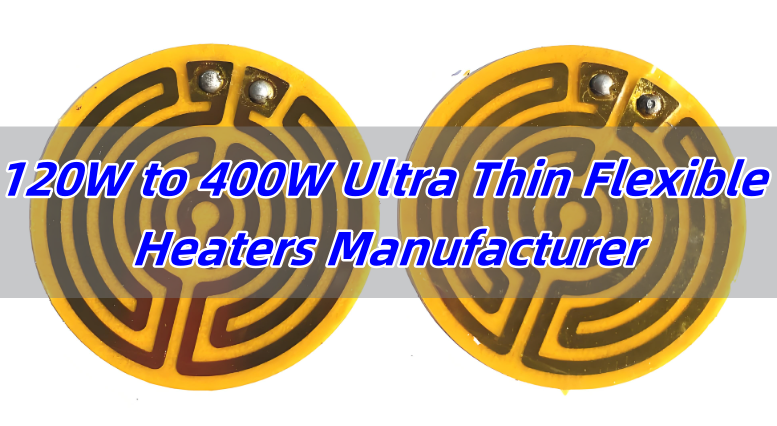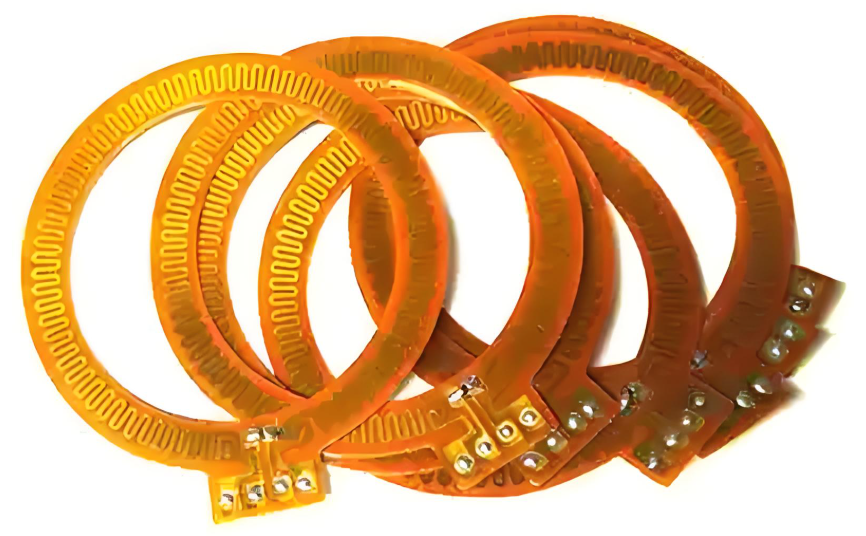An ultra thin flexible heater is a compact heating device built to deliver even warmth while adapting to different shapes and surfaces. They are made from thin substrates such as polyimide (Kapton) or silicone, combined with etched foil circuits or fine resistance wires.
The thickness can be as low as 0.13 mm. Even at this size, they can reach temperatures from -200°C up to 200°C. This ability to generate reliable heat in such a slim form is their key strength.
Unlike rigid heaters, they tolerate bending, shock, and vibration without losing performance. Their thin, lightweight form also allows engineers to integrate them into designs that require space-saving solutions.

The principle behind flexible heaters is resistive heating. When electrical current flows through the etched foil or resistance wire, the natural resistance generates heat. This heat is evenly distributed across the thin substrate, providing uniform thermal coverage.
Key design elements include:
Response time is one of their strongest qualities. Many ultra thin flexible heaters reach working temperatures within 10 to 30 seconds, compared to several minutes for bulkier heating solutions. When paired with sensors or controllers, these heaters can maintain temperature stability within ±1°C, which is critical in medical and aerospace systems.

Several factors determine the success of a flexible heater design.
When these factors are addressed, heaters perform reliably and support long-term use.
1. 0.2mm Polyimide Heater for Medical Device
| Product Name | Ultra thin Flexible Heater |
| Material | Polyimide (PI) |
| Total Thickness | 0.2mm |
| Dimension | 9.91mmx78.4mm±1mm |
| Power Density | 3.0W/in2 |
| Resistance | 60Ohms±5% |
| Working Temperature | ≤100℃ |
| Back Adhesive | 3M9460 |
| Wire Type | Telfon AWG30 |
| Wire Length | 70mm±5mm |
| Soldering Area Thickness | ≤2mm |
2. 230W PI Heater for Industrial Usage
| Product Name | Ultra thin Flexible Heater |
| Material | Polyimide (PI) + PCB |
| Conductor Thickness | 50um |
| Dimension | 160*209mm+40x25mm |
| Total Thickness | ≤0.3mm |
| Current | 14.6A |
| Power | 230W |
| Resistance | 1.1ohm |
| Environment Temperature | -40~150℃ |
| Working Temperature | 40℃ |
| PCB Surface Treatment | ENIG 1U’’ |
| Wire Length | 16AWG 300mm |
3. 12V Polyimide Heater for Consumer Electronics
| Product Name | Ultra thin Flexible Heater |
| Material | Polyimide (PI) + PCB |
| Dimension | 200*100mm |
| Total Thickness | 0.2mm (PI heater + adhesive) |
| Voltage | 12V (DC) |
| Power | 40W |
| Environment Temperature | -10~15℃ |
| Wire Length | 235±5mm |
| Temperature Control | KSD9700 (-10℃~10±5℃) |
Danyu offers advanced thermal solutions with a strong focus on quality and customer needs. We are certified to ISO9001, ISO13485, IATF16949, and AS9100D, meeting the requirements of industries such as medical, automotive, and aerospace.
Our team provides:
By partnering with us, you gain heaters built for precision, durability, and safety. Whether you need standard or custom designs, we delivers solutions that keep your systems performing at their best.
Q1: Are ultra thin flexible heaters safe to use?
Yes. With proper insulation and certification, they are safe for industrial and consumer use.
Q2: Can they be reused or repositioned?
Adhesive-backed types are usually for single use, while mechanically mounted heaters can be repositioned.
Q3: What is their typical lifespan?
With correct usage, they last five to ten years or longer.
Q4: Do they require external control?
Yes. Controllers or sensors maintain stability and improve energy efficiency.
Q5: Which certifications are important?
Look for ISO, CE, UL, and RoHS compliance, as well as sector-specific approvals.
Ultra thin flexible heaters provide a reliable way to manage heat in modern systems. Their slim profile, quick response, and precision control make them suitable for industries where size, weight, and accuracy are crucial.
From medical devices to EV batteries, they deliver dependable performance while adapting to unique requirements. As technology advances, their role will only expand. If you want high heating dissipation product, welcome to learn about our high-end product: Ceramic PCB and Metal Core PCB.
Simply drop your email or phone number in the contact form, and we'll promptly reply you shortly.